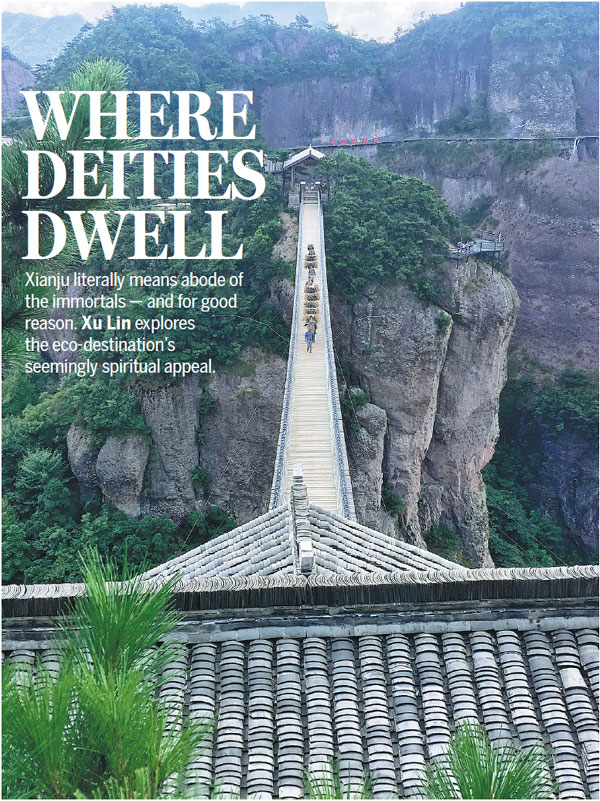Where Deities Dwell
By Xu Lin (China Daily) Updated: 2017-01-16 08:38Xianju literally means abode of the immortals - and for good reason. Xu Lin explores the eco-destination's seemingly spiritual appeal.
Ancient Chinese viewed deep mountains as the dwelling places of the gods - majestic, lofty and isolated.
That is, far from humans. Indeed, they seem the perfect earthly habitats of otherworldly entities.
But Xianju county and its Shenxianju scenic area live up to that reputation in more than their names - both translate as abode of the immortals.
Shenxianju's 22-square-kilometer terrain is shaped by unique igneous rhyolite formations.
It's a fantastical setting that has served as a filming location for many Chinese martial-arts TV series and movies, including the Sino-US film The Forbidden Kingdom, starring Jackie Chan and Jet Li.
A four-hour hiking route indeed offers what seems to be an almost spiritual experience.
It starts from a forested valley laced with streams that gurgle through the cracks among cliffs from which waterfalls gush.
Many mountains have been given anthropomorphic designations.
General Cliff resembles the crisp profile of a handsome, helmeted military leader.
In the distance is Sleeping Beauty Rock, which looks like a beautiful young woman reclining, clad in vegetation. Local lore has it that the general is guarding his lover.
A cable car leads up the sheer mountainsides. Walkways cling to the cliffs.
It's the kind of wonderland scenery, in the capital-W sense, that perhaps hints as to how Alice felt.
You almost wonder where exactly the gods hide among the mountains that stab through the mist.
Every step offers new vistas of gorgeous gorges.
One giant precipice is shaped like a man's face with an oversized nose that resembles Easter Island's statues.
The Guanyin Rock resembles Bodhisattva Avalokitesvara.
It appears as if the Goddess of Mercy is praying with her palms together in the sea of clouds.
Speaking of beings treading the skyline, Shenxianju has staged the International Highline Contest since 2014. Contestants cross the deep valleys on tightropes.
Lay visitors can cross via a 120-meter suspension bridge.
So do donkeys with supplies wobbling on their backs.
But Xianju offers other - perhaps less strenuous - hiking options.
The county has constructed nearly 500 km of green hiking trails, some of which can also be explored on two wheels.
Visitors to Danzhu Leisure Valley can stroll through bamboo thickets to enjoy rich biodiversity, cascades and brooks. Villagers there also sell honey.
About 26 kilometers away is the thousand-year-old Potan town, where ancient architecture lines cobblestone streets.
Historic sites include ancestral temples, a private school, a casino, a pawnshop and a brothel.
Cobblestones in the brothel's courtyard form the shape of an ancient Chinese coin. The message is clear - this is a place where you must spend money.
A secret back door offers discretion.
Nearby, Shanghengjie village offers a laidback feel.
It's a place to go slow.
The houses' white exteriors sport murals of such folk themes as mountains and flowers rendered in traditional wash-painting styles.
Large jars decorated by primary school students flank the streets.
They add color to the community, in every sense.
Local authorities spent three years implementing garbage-classification and sewage systems to protect the environment.
"Ecology is our priority," county tourism bureau head Li Bo says.
"The fusion of ecological and cultural tourism is essential to our appeal."
About four-fifths of the county is forested. People come for the pure water and the high density of negative oxygen ions, which are said to abet health.
In 2016, the Ministry of Environmental Protection designated Xianju as a "national ecological county".
Li says Xianju is an all-seasons destination.
Spring is the peak period, when visitors flock to the red-bayberry and canola-flower festivals.
Meanwhile, demand has propelled an urgency to build brand hotels while encouraging locals to open themed homestays and hostels, he says.
Visitors come to tour the places where immortals dwell.
They find much more.
Contact the writer at xulin@chinadaily.com.cn
If you go
Xianju is about three hours' drive from Zhejiang's provincial capital, Hangzhou. A 2.5-hour flight from Beijing arrives at Taizhou Luqiao Airport, about 100 km from Xianju.
|
Shenxianju scenic area in Xianju county, Zhejiang province, which boasts terrain shaped by unique igneous rhyolite formations, is called the abode of the immortals.Photos By Xu Lin And Erik Nilsson / China Daily |
- 'Cooperation is complementary'
- Worldwide manhunt nets 50th fugitive
- China-Japan meet seeks cooperation
- Agency ensuring natural gas supply
- Global manhunt sees China catch its 50th fugitive
- Call for 'Red Boat Spirit' a noble goal, official says
- China 'open to world' of foreign talent
- Free trade studies agreed on as Li meets with Canadian PM Trudeau
- Emojis on austerity rules from top anti-graft authority go viral
- Xi: All aboard internet express












